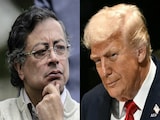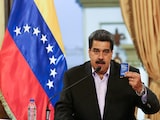After almost a decade of "negotiating with blood, sweat and tears," as Malaysia's trade minister put it, the Regional Comprehensive Economic Partnership was signed this weekend at the conclusion of an Association of Southeast Asian Nations summit. Fifteen countries - all of ASEAN, alongside Japan, South Korea, Australia, New Zealand and China - will be part of this giant trading bloc. Sixteen countries were due to join, of course, until India withdrew from negotiations.
The Indian government had at least one good reason for staying out of RCEP. New Delhi's consistent geo-economic goal has been to prevent Asian supply chains from growing more China-centric than they already are. To the extent that RCEP will reinforce China's central position in the web of intra-Asian trade, and membership would have signaled India's willingness to join a new Beijing-led economic order, Indian doubts about the agreement were justified.
Sadly, those factors probably aren't what really motivated India's withdrawal. We have to face facts: In spite of its pro-globalization, business-friendly rhetoric, the current Indian government has turned sharply protectionist in the past few years, reminiscent of the closed, faux-socialist 1970s when imports were strictly controlled and growth slowed to a crawl. Recent federal budgets have seen the government raise import tariffs across the board, something that hasn't been done since the country began opening up to the world in 1991.
This is why, incidentally, so many observers are worried by the government's latest buzzword: "self-reliant India" or, in Hindi, "aatmanirbhar Bharat." Self-reliance is a concept with a long history in India, running from Mahatma Gandhi's resistance to foreign manufactured goods in the 1930s to strict import substitution in the decades before 1991. Autarky is almost a reflex for Indian bureaucrats and politicians, who deep down remain convinced that if you buy something from abroad you are somehow cheating your own country.
When India walked out of RCEP, those bureaucrats and politicians justified the decision by claiming that previous free-trade agreements had "hurt" India. This has been the government's attitude since it was first elected in 2014; shortly after it took office, it launched a re-evaluation of every free-trade agreement India had signed. Officials - and lobby groups from politically powerful domestic industries - argue that several of those trade pacts wound up, in the first few years, increasing imports into India rather than exports from India.
There are, of course, two problems with this line of reasoning. First, as the government itself has pointed out, Indian exporters simply aren't as aware of free-trade benefits as they should be. (Last year, the government set up an "FTA utilization mission" to correct that.)
Second, just because imports have increased more than exports doesn't mean India has been hurt. India is Indians and, through free trade, Indians have gained access to more and cheaper goods. In the past, the volatile price of edible oils, for example, used to be a constant source of tension for Indian households and one of the most important drivers of consumer price inflation. Thanks to easy imports, that's no longer true.
India simply can't afford to turn its back on trade in this way. For one thing, domestic demand is not great enough to power India's growth. The Indian market may be huge, but, as Modi's former chief economic adviser put it in a recent co-authored op-ed, "foreign demand will always be bigger than domestic demand," which means India needs to resist "the misleading allure of the domestic market."
At the same time, whether we like it or not, the global trading order has been disrupted by the pandemic and by U.S.-China tensions. New supply chains are being explored; new connections are being made; trading infrastructure that will last for decades is being built. If India misses out on attracting some of that infrastructure, it could be locked out of several years of growth.
While it may be hard for India to rejoin RCEP, there are other free-trade agreements worth exploring. One with the European Union is overdue, for example. Geopolitical considerations, India's history and economic common sense all say that's a deal worth signing. If India holds back, somebody else will benefit; Vietnam signed its own pact with the EU this year. Protectionism, not openness, is what will really "hurt" India.
(Mihir Sharma is a Bloomberg Opinion columnist. He was a columnist for the Indian Express and the Business Standard, and he is the author of "Restart: The Last Chance for the Indian Economy.")
Disclaimer: The opinions expressed within this article are the personal opinions of the author. The facts and opinions appearing in the article do not reflect the views of NDTV and NDTV does not assume any responsibility or liability for the same.
(Except for the headline, this story has not been edited by NDTV staff and is published from a syndicated feed.)















